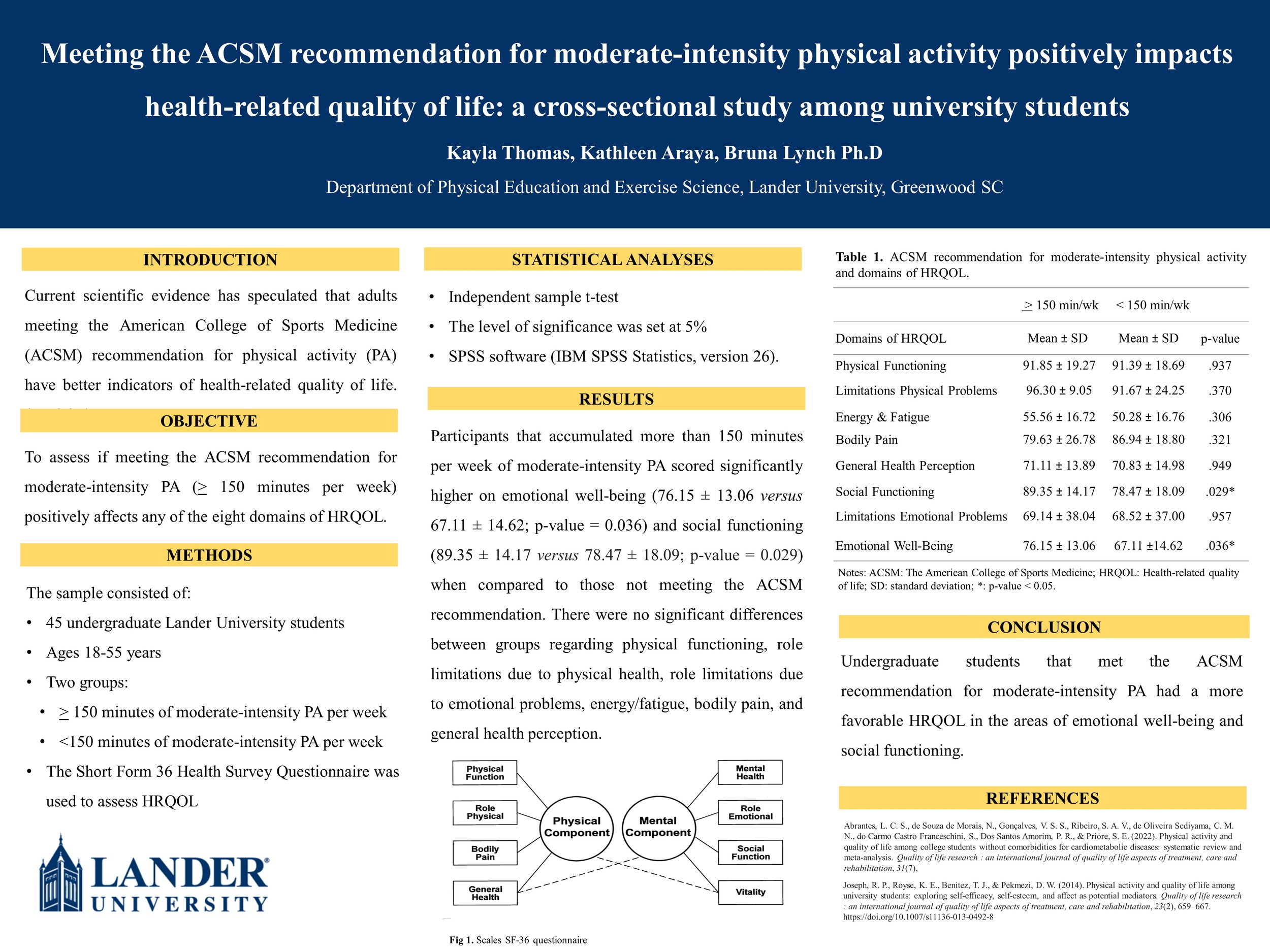Meeting the ACSM recommendation for moderate-intensity physical activity positively impacts health-related quality of life: a cross-sectional study among university students
Kathleen Araya, Kayla Thomas, Bruna Lynch
Current scientific evidence has speculated that adults meeting the ACSM recommendation for physical activity have better indicators of health-related quality of life (HRQOL). Objective: To assess if meeting the ACSM recommendation for moderate-intensity physical activity (> 150 minutes per week) positively affects any of the eight domains of HRQOL. Methods: Undergraduate students attending Lander University (Greenwood, SC) were invited to participate in the study if they were registered in activity (ACT) classes or wellness for life (WFL) classes. The Short Form 36 Health Survey Questionnaire (SF-36) was used to assess HRQOL (eight domains: physical functioning, role limitations due to physical problems, energy/fatigue, bodily pain, general health perception, social functioning, role limitations due to emotional problems, and emotional well-being). When scoring the SF-36, a higher score is indicative of more favorable HRQOL. The ActiGraph GT3X+ triaxial accelerometer (ActiGraph, LLC, Pensacola, FL, USA) was used to assess physical activity levels (duration and intensity) over a 7-day period, and participants were categorized into two groups: < 150 minutes of moderate-intensity physical activity per week or > 150 minutes of moderate-intensity physical activity per week. Independent and dependent variables were checked for normality using the Kolmogorov-Smirnov test, and the comparison between different moderate-intensity physical activity groups was performed using independent sample t-test. The level of significance was set at 5% and analyses were conducted using the SPSS software (IBM SPSS Statistics, version 26). Results: Participants that accumulated more than 150 minutes per week of moderate-intensity physical activity scored significantly higher on emotional well-being (76.15 ± 13.05 versus 67.11 ± 14.62; p-value = 0.036) and social functioning (89.35 ± 14.16 versus 78.47 ± 18.09; p-value = 0.026) when compared to those not meeting the ACSM recommendation. There were no significant differences between groups regarding physical functioning, role limitations due to physical health, role limitations due to emotional problems, energy/fatigue, bodily pain, and general health perception. Conclusion: Undergraduate students that met the ACSM recommendation for moderate-intensity physical activity had a more favorable HRQOL in the areas of emotional well-being and social functioning.
Kathleen Araya graduated from Greer High School in Greer, SC. She is currently a senior exercise science major with an emphasis in occupational therapy and a minor in psychology. She is the chair of the Social Committee for the PEES Club Leadership Team. In the fall of 2022, she accepted a position as a Rehabilitation Technician at an outpatient clinic in Greenwood, SC. Through this experience she is exposed to a variety of rehabilitation treatments in both physical and occupational therapy. She also has been involved in different volunteer opportunities throughout the Greenwood community. Kathleen will be graduating from Lander University in the Spring of 2023.
Kayla Thomas graduated from Clover High School in Clover, SC. She is currently a senior exercise science major at Lander University. She has interned in an outpatient cardiopulmonary rehabilitation setting as well as inpatient physical therapy setting. During the fall of 2020 semester, she began working as an Emergency Medical Technician for Greenwood County. She is also currently serving in the South Carolina Army National Guard as a combat medic specialist. Kayla will be graduating from Lander University in the Spring of 2023.
